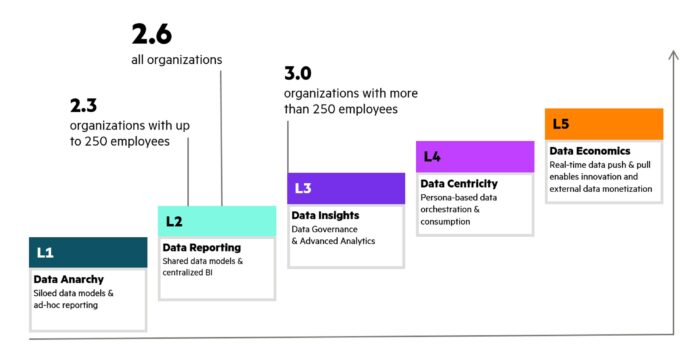A lack of data maturity hinders both the private and public sector from achieving key outcomes such as growing sales or advancing environmental sustainability, according to a global survey by Hewlett Packard Enterprise (HPE).
Conducted by YouGov on behalf of HPE, the survey covered more than 8,600 decision makers from across industries and the public sector in 19 countries — including 500 respondents in Singapore.
Results reveals that the average organisation’s data maturity level – or ability to create value from data – is 2.6 on a five-point scale (2.8 in Singapore), with only 3% reaching the highest maturity level.
“There is broad consensus that the world’s data holds an enormous potential to advance the way we live and work – however, unlocking this potential requires a shift in organisations’ digital transformation strategies,” said Antonio Neri, president and CEO of HPE.
“We must move from ‘cloud first’ to ‘data first’ as the North Star of digital transformation – meaning that organisations align their strategic, organisational and technological choices with the overarching goal of leveraging data as a strategic asset,” said Neri.
The survey is based on a maturity model developed by HPE that assesses an organisation’s ability to create value from data based on strategic, organisational and technological criteria.
The lowest maturity level (1) is called “data anarchy,” when data pools are isolated from one another, and are not systematically analysed to create insights or outcomes.
The highest level (5) is called “data economics,” when an organisation strategically leverages data to drive outcomes, based on a unified access to both internal and external data sources which are analysed with advanced analytics and artificial intelligence.
Survey results reveal that 14% of organisations are on maturity level 1, 29% on level 2 (“data reporting”), 37% on level 3 (“data insights”), 17% on level 4 (“data centricity”), and just 3% are on level 5).
Among firms surveyed in Singapore, 12% are on level 1, 24% on level 2, 39% on level 3, 22% on level 4, and also 3% on level 5.
The lack of data capabilities, limits organisations’ ability to create key outcomes such as growing sales (30%), innovating (28%), advancing customer experience (24%), improving environmental sustainability (21%) and increasing internal efficiency (21%).
The survey provides a detailed view of the strategic, organisational and technological gaps that organisations must close to capitalise on data along their entire value chain.
Yet, only 13% of respondents globally and 16% in Singapore say that their organisation’s data strategy is a key part of their corporate strategy.
Almost half of respondents say their organisation allocates either no budget for data initiatives (global average, 28%, Singapore, 23%) or only occasionally funds data initiatives via the IT budget (global average, 20%, Singapore, 17%).
Only 28% globally and 36% in Singapore confirmed they have a strategic focus on providing data-driven products or services.
Also, almost half of respondents say their organisations do not use methodologies like machine learning or deep learning but rely on spreadsheets (global, 29%; Singapore, 31%) or business intelligence and canned reporting (global, 18%; Singapore, 15%) for data analysis.
Creating value from data also requires aggregating data or data insights from different applications, locations or external data spaces.
For example, a manufacturer’s sensor telemetry from sold products can help the R&D department to better align the next product generation with customer needs, and sharing insights from patient data among hospitals can advance medical diagnosis.
















